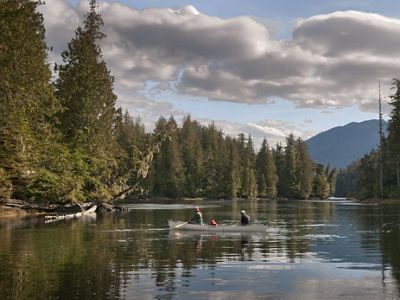Nature United Welcomes Set of Conservation Commitments from BC that Support Nature and People
Media Contacts
-
Jacqueline Nunes
Phone: +1 437-291-3287
Email: jacqueline.nunes@natureunited.ca
Nature United applauds a suite of recent announcements made by the Province of BC over the last few weeks that advance Natural Climate Solutions, finance Indigenous-led conservation and safeguard biodiversity. Taken collectively, these announcements reflect momentum in the right direction and highlight the importance of collaboration between Federal, Provincial and Indigenous governments, which is critical to addressing the dual biodiversity and climate change crises, while reaching Canada and BC’s 30x30 targets. As we mark almost a year since COP15, provincial leadership of this level is integral to achieving Canada’s 2030 climate and biodiversity goals.
These announcements include:
Tripartite Framework Agreement on Nature Conservation - This new framework, which accounts for $1 billion, between the Federal, British Columbia and First Nations governments will enhance conservation in BC, while affirming Indigenous rights and authority on their territories. The first tripartite nature agreement in Canada, it is a model for tripartite collaboration that provinces and territories around the country can look to when developing their processes for advancing equitable conservation. In particular, this agreement showcases how governments and Nations can come together to ensure that public funding for conservation is coordinated and centers respect for Indigenous governance, territorial sovereignty, and knowledge as pre-requisites of successful nature protection and resource management in the province.
Conservation Financing Mechanism – This $300 million fund, which is made up of match funding between the Province of BC and BC Parks Foundation, will be used to advance Indigenous-led conservation and guardian programs, ensuring capacity support for First Nations, alongside development of low-carbon economic opportunities.
Biodiversity and Ecosystem Health Framework - This draft framework — open for consultation until January 15, 2024 — is intended to improve stewardship by implementing the recommendations from British Columbia’s Old Growth Strategic Review and upholding commitments under the Declaration on the Rights of Indigenous Peoples Act. This framework will integrate conservation initiatives across many departments and is currently being developed in consultation with First Nation governments and other parties. Members of the public can access the draft framework here.
Quote: Michael Reid
First Nations need to be equal participants in decisions about their territories and Indigenous knowledge and science is critical to ensuring the right balance between natural resource management and the protection and restoration of vulnerable ecosystems.
These announcements show a level of ambition and leadership that the Province is committing to. “All told, British Columbia and the federal government have announced an initial investment of almost $1 billion to conserve the province’s incredible forests, coastlines and biodiversity — ecosystems that communities in B.C. and across Canada depend on,” noted Hadley Archer, Executive Director of Nature United. “This level of ambition and commitment to work in partnership with Indigenous leadership and stewardship is a step towards advancing climate, biodiversity and reconciliation targets in tandem, while building capacity and creating opportunities in communities.”
It now falls to all parties to the agreements and announcements to translate them into tangible progress that demonstrates how policy, innovation and collaboration can create lasting benefits for climate and nature, while contributing to a more resilient and prosperous BC.
“First Nations need to be equal participants in decisions about their territories and Indigenous knowledge and science is critical to ensuring the right balance between natural resource management and the protection and restoration of vulnerable ecosystems,” said Michael Reid, British Columbia Program Director, Nature United, “We look forward working with parties to the agreement to advance tangible progress towards lasting benefits for climate and nature, while contributing to a more resilient and prosperous BC.”

Nature United is committed to creating more resilient ecosystems and communities and has long worked in partnership with Indigenous communities in BC to realize the priorities and interests of First Nations to inspire new models for Indigenous-led conservation. Nature United has supported innovative partnerships in BC for over a decade, including in the Great Bear Rainforest, which showcases the potential to simultaneously conserve millions of hectares of temperate rainforest, finance Indigenous stewardship and facilitate the transition to a more diverse and sustainable regional economy.
Over the coming months, Nature United will continue to work with partners to amplify the importance of this work and ensure that these funds catalyze investments in community well-being and sustainable economic development. We remain committed to supporting the Province and First Nations in this crucial work for the people of BC and all its natural assets.
The Province must now take the next steps to ensure that these announcements are translated into meaningful action, including support for Indigenous Protected and Conserved Areas; a sustainable and resilient forestry sector; and more action on the ground for old-growth forest protections that align with the interest and priorities of First Nations. Seeing meaningful steps forward in the months ahead will be critical for success.
Nature United was founded as a Canadian charity in 2014, building on decades of conservation in Canada. Headquartered in Toronto, our organization has field staff located across the country. Nature United supports Indigenous leadership, sustainable economic development and science and large-scale conservation, primarily in British Columbia, the Northwest Territories and Manitoba. Our organization is also working to accelerate Natural Climate Solutions at national and regional scales. To learn more, visit natureunited.ca or follow us on Linkedin, Instagram and Facebook.
We are the Canadian affiliate of The Nature Conservancy, a global conservation organization with more than a million members and a diverse team that includes more than 400 scientists. Our global organization works in more than 80 countries and territories — either directly or through partnerships — to conserve the lands and waters on which all life depends. To learn more, visit www.nature.org or follow @nature_press.
